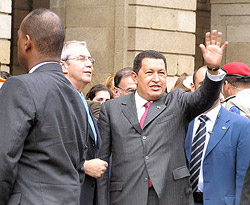There are things that remain sacred. With that said, we could have considered the New York summit following the speech made by the Iranian president at the UN summit this year and his “complementary” interviews as not too startling if it weren’t for Venezuelan president Hugo Chavez. Chaves, who can compete with leaders of the 21st century such as Turkmenbashi, Ahmedinejad, Fidel Castro (perhaps Nikita Khrushchev from the past), has an advantage. He is one to criticize Bush out in the open, aggressively, accented pronunciation and undiplomatic terms. This time, he called Bush the devil, evil and a dictator from the UN podium. A week before that, he had said that American special services had something to do with the September 11 terrorist acts and before that, he declared that he didn’t approve of the newly elected Mexican president because there had been some falsifications during the elections. The White House isn’t reacting to Chavez’s remarks. Instead, U.S. Congressmen are taking care of the situation. Congressman from New York Charles Rangel said:
“If you’re living in my country, then you have to respect my president. This is intolerable. Only Americans can criticize Bush.” Another Congressman said that if any Venezuelan tried to criticize Chavez, then that person would die. They would burn the national flag, organize demonstrations and it’s quite possible that they would call him a persona non-grata.
Venezuelan Jairo Jose Toro, 27, studies at the Political Science department of the American University of Venezuela and says that he has a negative attitude towards Chavez. On the one hand, he agrees with all that Chavez said about Bush, but on the other hand, he believes that Chavez focuses too much on world issues and forgets that “Venezuela isn’t able to overcome poverty despite its rich oil resources”. According to Jairo Jose, Venezuela is divided into the followers and opponents of Chavez. In fact, his opponents express their concerns during private discussions because they are afraid of the authorities. In 1999, there was a referendum for giving more power to the Venezuelan president. The election was the following: to give or not to give Chavez power? The electronic databases were used during the voting. Now, all the citizens that voted “No” were simply having “difficulties” in finding jobs. The government violated the secrecy principle and used that database in order to reconcile with the citizens of Venezuela, who voted “no” during the referendum. Currently, there are civic groups that teach the people “how to go to war”. Jairo Jose talks about that PR act with a smile on his face. “Yes, I know about that. I don’t think it’s serious. I’m a pacifist and don’t believe in war. I don’t think there will be a war.” There won’t even be a war. Do you know why? It’s because Venezuela is one of America’s economic partners and the major country purchasing oil from the U.S. That’s why the White House isn’t paying much attention to the announcements made by the Venezuelan president, according to which the U.S. attempted to organize a state revolt in Venezuela in 2002. Chavez’s “American tour” ended in Harlem, where he met with socialist students. They welcomed the Venezuelan president with applause. After a while it became clear that the participants had been “awarded”. Chavez will later find out that during his big speech at the New York airport, American customs officials were investigating the luggage of Chavez’s Minister of Foreign Affairs by violating the rule of keeping stable diplomatic ties…

